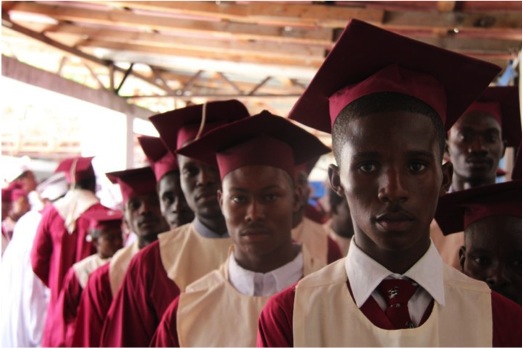Interview with Yele Haiti CEO Derek Johnson
Above: graduates from the charity’s vocational training programme in July
By Alexander Britell
Yele Haiti, which was founded by Haitian-American singer Wyclef Jean, Jerry Duplessis and Hugh Locke in 2005, had a large hand in the recovery efforts in Haiti following the catastrophic earthquake in January 2010. Jean ultimately resigned from the charity in 2010. As the focus of aid to Haiti has shifted in focus from the still-ongoing recovery efforts to a look at development, something Caribbean Journal discussed with Clinton Bush Haiti Fund CEO Gary Edson earlier this year, Yele Haiti has adapted as well, with new initiatives aimed at helping Haitians on the path toward self-sustainability. To learn more, Caribbean Journal talked to Yele CEO Derek Johnson, who was named to the post in 2010, about Yele Haiti’s recent work, the process of reconstruction in Haiti, and a response to a series of recently published allegations about the charity in the New York Post.
What has Yele Haiti been working on of late?
Six months ago, we made a donation of the first publicly-available CT scanner in the country – that was a major initiative for us, in partnership with Project Medishare, which is on the ground in Haiti, because it had the ability to provide early diagnosis, and then accordingly treat diseases and other health circumstances that might have gone undetected. We also have begun a rather dramatic shift from relief to recovery initiatives. As the country begins to move from the catastrophic emergency circumstances that befell it as a result of the earthquake, that means helping to find more long-term systemic solutions for the people. We at Yele have likewise tried to direct our attention and the little resources we still have on efforts that would better suit and better serve the public by instilling skills, providing opportunity and offering them a chance to better themselves. That has led us to a series of initiatives in vocational training. In July, we graduated 111 of the 120 students that started in our vocational training programme in construction. We now have 120 students similarly in a hospitality programme up in Jacmel, and we will in the next two weeks announce a third programme, this time in communications, that we are quite excited about.
How has the process of reconstruction in Haiti been, in your view?
I think it is fair to say that there is widespread agreement that it’s too slow – and that, at this point in time, there is a lot to be desired in terms of gathering more robust momentum. But the seeds of some exciting things are being sown, and I expect some major announcements today out of the IDB conference. While we all would like to have seen more momentum sooner, there are some hopeful signs, and we expect to build on those.
How would you describe the shift from relief to recovery?
I can’t speak to everyone, but we at Yele are seeing a movement towards – and obviously like any movement it’s partial and sporadic – but we are seeing a gradual movement towards solutions that allow people self sustainability. The best example I can give is that, for instance, the provision of water, food, clothing and medical supplies is obviously a vital necessity for continued survival in the first instance, but ultimately that form of aid and assistance invariably runs out. And the question is, how do you give people the tools that they can help themselves with. It is on that line of thinking that has led us to make that a priority in the vocational training space, because w believe that if you focus on those areas that will be crucial to the country’s reemergence, then people will have skills that are in demand. So the construction industry, for example, whether the government chooses to build hospitals, roads, laboratories, schools, incubators, the reality is that the demand will be for people who are skilled in the construction trade.
Are there any areas of Haiti in which you’ve seen particular progress?
I think the hospitality and tourism sector and the healthcare sector are both showing significant signs of improvement, but, more importantly, signs of opportunity. As an example, virtually every other Caribbean island caters to tourism initiatives, and tourism is a leader of their respective economies. That should be the same for Haiti. The government has, along with multiple private sector partners, appeared to be appropriately focused on seizing that opportunity. You only have to look across the divide to the Dominican Republic to see just how prosperous and impactful the tourism sector can be – and Haiti needs to take advantage of the opportunity to build greater bandwidth in that space. And we would say the same is true for the healthcare sector.
What have been your priorities since taking over as CEO?
Well, we have been focused, first and foremost, on trimming the breadth of our initiatives, and gaining strategic focus – a sort of first-mover advantage in a niche space. We have been trying to figure out who are the right set of partners toward what ends going forward, and how we, together, can help move Haiti forward. Because certainly no single organization, let alone a small grassroots NGO, is going to move the needle by itself, and we’ve been focused on our future – how do we bridge the immediate gap, and sustain ourselves for a long-term future.
What do you think about the allegations made in the New York Post yesterday?
I think that was unfortunate, obviously. Both for us, for the New York Post, but perhaps most importantly for the efforts aimed at Haiti, more broadly. There is ample rebuttal now to the variety of allegations that were made, and I think last night the Miami Herald and a couple of others have begun to pierce the veil of these “allegations.” They have found that there’s no there, there. But the thing that troubles me is less the specifics of every single allegation, and more the context in which the report was made, or the context that was lacking in the report. For instance, of the million dollar contract to the fellow they believe wasn’t deserving of it, they failed to mention that for that million dollars, Yele was able to feed a hundred thousand people in what is indisputably the largest human disaster in the last century.
They failed to mention that for that million dollars, Yele was able to feed a hundred thousand people in what is indisputably the largest human disaster in the last century.
This was a time when multiple hundreds of thousands of people were killed – and hundreds of thousands of others were not killed, but maimed and wounded. There were parents lacking awareness as to their children’s whereabouts, and children unsure where to find their parents. There were homes destroyed, shelter lost, people without clothing. And Yele stepped up — absent the luxury of the big NGO apparatus – to serve a hot meal to people in a dire situation. And not 10 people or 100 people, but 100,000 of them. And that reality is unaddressed by the Post – or unmentioned. And I think that lack of balance sort of raises questions about objectivity, and about the fairness of their investigative reporting.
In some measure, as difficult as it is for Yele, it is more tragic in the broader sense of things, because obviously – as they intended – it induces a measure of cynicism and skepticism about credible, well-purposed and well-serving humanitarian efforts like Yele Haiti. I like to say that we are the little engine that could – we are not the Red Cross – in scale or breadth. We are a little, grassroots-oriented NGO aiming to do good work in the community that is generally left underserved by others.







